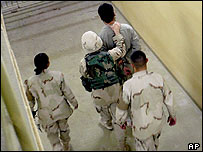
>
Twenty-seven military intelligence personnel were involved in abusing Iraqi prisoners at Abu Ghraib jail, a new US army report has found.
Investigators found senior commanders at the jail knew about the abuses but failed to act.
The report comes a day after another panel faulted Pentagon leaders over the abuse, but mainly blamed soldiers and their superiors at the prison.
Seven soldiers have been charged in the abuse scandal.
'Disturbing facts'
The new Fay report, which takes its name from one of the investigation team Gen George Fay, focused on the role of a military intelligence unit at the prison.
"We discovered serious misconduct and a loss of moral values," Gen Paul Kern, who led the inquiry, told reporters.
27 military intelligence personnel accused,
8 personnel knew of abuse but did not act,
Senior commanders at fault.
He said the probe "revealed disturbing facts" about the behaviour of "a small number of soldiers" who served in Abu Ghraib prison, west of Baghdad.
Four of the 27 incriminated personnel were civilian contractors working as interrogators, Gen Kern said.
He said another eight, including two civilians, were aware of the abuse but failed to report it.
Gen Fay said the investigation had found "a few instances where torture was being used".
Gen Kern said the worst example of abuse occurred when dog handlers used their animals to try to make teenage detainees defecate out of fear.
The report also found US forces improperly hid at least eight inmates from the International Committee of the Red Cross - so-called "ghost detainees".
Leadership 'failures'
The executive summary of the report says there is "no single, simple explanation for why the abuse at Abu Ghraib happened".
It blamed the abuse on "misconduct (ranging from inhumane to sadistic) by a small
group of morally corrupt soldiers and civilians, a lack of discipline on the part of leaders and soldiers".
SCHLESINGER ABUSE REPORT
Written by independent panel
Critical of top Pentagon and military officials.
Blames soldiers and local commanders.
Most computers will open PDF documents automatically, but you may need to download Adobe Acrobat Reader.
Senior commanders in Iraq were singled out for a "failure or lack of leadership".
It also blamed some of the problems at Abu Ghraib on "the interrogation practices of other government agencies" - a term used by the Pentagon for the Central Intelligence Agency (CIA).
The BBC's Adam Brookes in Washington says the Fay team - in common with other investigators - did not call for high-level resignations.
But he adds that the findings appear to contradict the Bush administration's stance that the abuses at Abu Ghraib were just the work of a few isolated individuals.
Lawrence di Rita, the chief Pentagon spokesman, told the BBC it was still too early to draw conclusions from the first reports.
"[Defence Secretary Donald Rumsfeld] has taken the view from the beginning that we're going to learn a lot, that there's going to be additional revelations, and I don't think he's been surprised that additional revelations have occurred," he said.
"He's reviewing the findings and we will determine what the next best steps are."
Investigations
The Abu Ghraib scandal surfaced in April when photographs of hooded and naked Iraqi prisoners being maltreated were first published.
The US military ordered five investigations into conditions at the prison, of the Fay report is the third to be submitted.
An internal report completed in March by Maj Gen Antonio Taguba uncovered "numerous incidents of sadistic, blatant, and wanton criminal abuses" at the prison.
A defence department report released on Tuesday laid the blame for the abuses with the soldiers involved and their commanders.
However that independent panel of investigators, headed by former Defence Secretary James Schlesinger, said indirect responsibility for the conditions that led to the Abu Ghraib mistreatment and other abuses went right to the top of the Pentagon's chain of command.

WATCH AND LISTEN
The BBC's Nick Childs
"They very likely face serious consequences"





